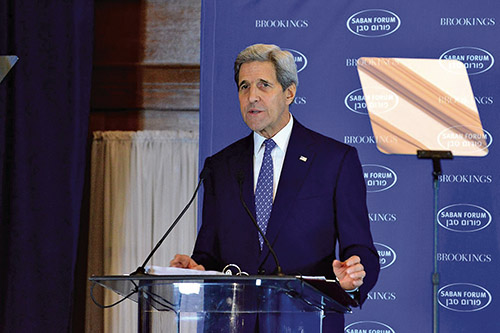
WASHINGTON—A new leaked email shows that a speech by Democratic nominee Hillary Clinton last December left senior Israeli officials worried she might lean toward the Palestinians if elected president.
The latest WikiLeaks disclosures included a number of emails sent by former U.S. Treasury Secretary Stuart Eizenstat to senior Clinton adviser Jake Sullivan in 2015 concerning Israel and related topics.
In a December 8, 2015 email, Eizenstat described a breakfast meeting he had with “a senior Israeli official who is very close to the Prime Minister.” Much of their talk focused on the Saban Forum, which had been held at Washington’s Brookings Institution several days earlier. Eizenstat did not name the official, however, the Israeli newspaper Haaretz has reported “in all likelihood, it was Dermer,” since he participated in the Saban conference, referring to Israel’s Ambassador to the U.S. Ron Dermer.
Eizenstat informed Sullivan that the Israeli official was concerned “that most of the emphasis [at the Forum] was on the Palestinian issue, and he wonders if a Clinton Administration ‘will be a Saban Forum for four years.’” According to Eizsenstat, the Israeli official considered Clinton’s speech “95 percent good, although there was some moral equivalence language.”
Eizenstat described himself as a close acquaintance of Dermer, and offered to serve as the Clinton campaign’s “formal or informal emissary to Israeli government officials.”
The Saban Forum is an annual event that started in 2009 under the auspices of the Brookings Institution. The forum was founded by Haim Saban, a major donor to the Clinton presidential campaign and the Clinton Foundation. Former U.S. Mideast envoy Martin Indyk, who has frequently clashed with Israel’s leaders, is the executive vice president of Brookings and organizer of the Saban Forum.
A careful analysis of Clinton’s speech suggests that the 95 percent figure may have been somewhat generous.
Blaming both sides
At several points in the speech, Clinton used what the Israeli official called “moral equivalence language.” Referring to the wave of Palestinian knife attacks against Israelis, Clinton said, “Brutal stabbings, shootings, and vehicle attacks that seek to sow fear among the innocent. Israeli children have been killed as have Palestinian children.” It was not clear which Palestinian children she was referring to aside from minors who were shot while trying to kill Israelis.
Later in her speech, Clinton referred to “the violence that are [sic] coming from Palestinians toward Israelis and, again, let’s be honest, from some Israelis toward Palestinians…”
In her speech, Clinton was reluctant to criticize the Palestinian Authority for inciting and encouraging the knife attacks. She said, “Palestinian leaders should condemn and combat incitement in all of its forms,” but did not acknowledge that those leaders engaged in incitement. Clinton praised Palestinian Authority President Mahmoud Abbas, saying, “he has certainly been willing to explore different ways of cooperation and confidence-building.”
She also took a swipe at Abbas’s critics, saying, “I think it’s been unfortunate that he’s been in many eyes marginalized when there really is as yet no alternative.”
Clinton did not refer to the controversial statement made by Abbas in the official PA daily, Al-Hayat Al-Jadida, less than three weeks earlier on Nov. 17. Abbas called the wave of knife attacks “a peaceful uprising,” and justified the attacks as having been “caused by the occupation, oppression, injustice, and aggression against our people…”
In her Saban Forum remarks, Clinton also suggested that leaders on both sides were equally to blame for the absence of peace, when she called on ordinary Israelis and Palestinians to “demand their leaders seek every opportunity to demonstrate their commitment.”
Another aspect of the Clinton speech that may have worried Israeli officials was the imbalance in the actions that she urged Israeli and Palestinian leaders to take. While calling on Israel to take specific steps on the ground, she urged the Palestinians to take actions that were verbal or unspecified.
For example, she said in order “to create conditions for progress,” Israel should “take steps…with respect to settlements,” while the Palestinians should refrain from “unilateral action at the United Nations.” At another point, she urged Israel to specifically provide the Palestinians with “access to water, protection of their agricultural lands, more investment,” while asking the Palestinians to “provide better security for Israelis,” without specifying what exactly she expected of them.
Bush vs. Clinton on settlements
Clinton also took a hard line against Jewish settlements in the disputed territories. In response to a question, she asserted that “every administration, Republican and Democratic alike, have had the same policy on settlements. That’s just something that all American governments have [had] for the last decades. And we have tried different approaches to persuade the Israeli government not to be expanding the territorial reach of settlements.”
Actually, the George W. Bush administration took a different position regarding the large Israeli settlement blocs. On April 14, 2004, President Bush wrote to then-Israeli prime minister Ariel Sharon, saying, “In light of new realities on the ground, including already existing major Israeli population centers, it is unrealistic to expect that the outcome of the final status negotiations will be a full and complete return to the armistice lines of 1949.”
It was then-Secretary of State Clinton who disavowed the Bush commitment. She told reporters on June 17, 2009, “in looking at the history of the Bush administration, there were no informal or enforceable agreements” with Israel regarding settlements. However, Elliot Abrams, the U.S. Mideast envoy who negotiated the language of Bush’s letter, responded in a Wall Street Journal op-ed that the letter did constitute an agreement with Israel, which the U.S. had brokered in exchange for Israel’s withdrawal from Gaza.
By Rafael Medoff/JNS.org










